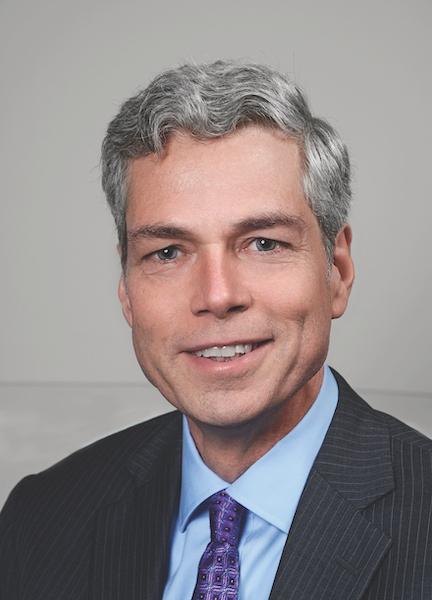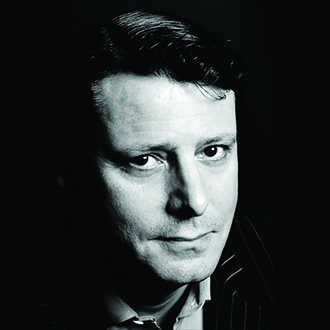It’s hot outside, broiling actually, but White Plains Mayor Tom Roach is looking cool and collected today, spruced in his signature mid-gray suit, pale blue shirt and well-polished black Oxfords. And if his tie looks familiar — swirls of pale-blue ogees on a dark-blue background, it is possibly because I have the same one.
We’re sitting in the Common Council chamber in City Hall in White Plains, his honor and I, around the kind of vast, baronial oak table that makes social distancing a breeze, talking about masks. Mine’s a standard issue, single-use face mask, but the mayor’s is an altogether more pukka affair, a slimline respirator mask, which seems to caress the mayoral face, tapering off with the elegance of a duck’s bill. Effective too, I’ll bet.
“Masks are not comfortable,” declares the mayor. “But they’re only a minor inconvenience.” He has not always been as attentive to his mask as he is today, he confesses. When he visited Burke Rehabilitation Hospital to honor health care workers at the height of the pandemic, his mask was actually broken. A mayoral wrist-slap, or the equivalent thereof, was administered and a new mask produced. The mayor learned his lesson.
It’s refreshing to see that, even in a time of crisis, Roach has a sense of humor, which is not to say he isn’t also deadly serious about Covid-19. His firm and assured leadership has served the city well through the worst of the pandemic and continues to do so. His evening broadcasts across all manner of media — robocalls, texts and email — as comforting as any bedtime story.
Tom Roach was born in White Plains and his kids are the fifth generation to be born in the city. The family, though, was originally from County Mayo in the west of Ireland and the family name, he says — actually Norman in origin — toughened him up for politics. Kids can be cruel, he explains. “Mind you, it helped that I had Peter Wolf in my class, ’cause he got a lot of grief, too.” He waits for the penny to drop. “I mean, if your last name is Wolf, why would you call your kid Peter?”
At a time when the word “diversity” is, or should be, on everybody’s lips, the mayor is proud that White Plains has long been a city for everybody. Since he’s been in office, he’s seen his brief (he is an attorney, after all) as ensuring that the city is a place for people of every economic persuasion, that folks from every background “belong.” He says this is what makes White Plains stand out from many other communities. “We don’t have a hospital on this side of town or that side of town. We have a hospital for everyone. We have a school system for everyone.”
How has the city been doing, I wonder, before Covid-19 raised its dangerously ugly head? “We were doing great. We were thriving. We were the go-to destination.” The city was taking proposals for its trains station properties — with work at White Plains Metro-North station already far advanced, giving the city a long overdue, slick new gateway, and business was generally booming. “(Our plans) were exciting and wonderful. We had Cirque du Soleil trying to get in here. Their management kept saying the only place they wanted to be was White Plains.”
The mayor, outward-looking, resourceful, aesthetically minded, called Lennar — the people responsible for the luxury residential building project at the corner of Mamaroneck Avenue and East Post Road, who are also developing the Westchester Pavilion a few blocks away — and a deal was struck. Cirque du Soleil would come in for a two-month residency downtown, “with all the revenue but also the pride.”
The mayor, it seems has a vision for good design and for quality. And he has consistently shown that quality building and development pay their way. Immediately prior to Covid, the city’s savings were up, commercial vacancies downtown were at their lowest in decades and crime was low. The real estate market was strong.
But then the pandemic struck. “It was like being on the deck of a battleship and being fired at all day long,” reflects the mayor. Every day there was a new situation to deal with. A typical day would be checking email on waking, then going out to the food banks the city had created. Next up was checking in with Susan Fox, CEO of White Plains Hospital (which he did at least once a day, every day the pandemic was raging) and personally delivering supplies to homeless shelters and care homes (“I always go direct to the superintendents. They’re the ones that know what’s going on.”) Then there were county calls to take and, vitally, getting on Gov. Andrew Cuomo’s daily press conference, pad and pen in hand. What does Roach think of the governor, a fellow Democrat? “I think he’s handled this crisis really well,” says the mayor.
And the federal government? “The federal government is a whole other story,” he says, with a roll of the mayoral eyes.
Working in a near-deserted City Hall, writing and recording the robocall which, at the height of the crisis, went out daily to all White Plains residents, was another challenge undertaken by the mayor, with help from Special Projects Director Jill Ianetta. “You have two minutes and 30 seconds and nothing is worse than, on your ninth attempt, you get it done and then the message informs you that the recording you made has overrun by seven seconds and you have to start all over again.” It was a struggle, he says, to get it done by 7 p.m. “And if we didn’t, there’d be complaints.”
I compliment him on his Spanish, which is now reduced to just one line, although he used to record all messages to the city in Spanish himself. (That task is now undertaken by his Chilean assistant, Mariam Elgueta.) He says, modestly, that it is only “high school level,” but admits to having an aptitude. “I think my pronunciation’s pretty good,” he says chirpily. “And I can order a beer in any language.”
A runner and impressive marathoner (personal best: 2:47:47,) running as well as talking with colleagues during the crisis has helped keep Roach sane and focused. Reading is a favorite pastime. At the time we meet, he has just finished Margaret Atwood’s “The Testaments,” the sequel to “The Handmaid’s Tale,” and is getting stuck into Richard Powers’ Pulitzer Prize-winning novel, “The Overstory.” “Phone directories,” he calls these books, referring to their size, while acknowledging that the term is now archaic. He also meditates.
In a post-Covid world, he is looking forward to returning to Canada — Toronto and Montreal are favorite cities — and, in the shorter term, perhaps getting up to the Adirondacks for a break with his family, although he feels anxious being away from White Plains. His weekly robocalls, meanwhile, will continue for the foreseeable future, as — in his own words — “we are learning to adapt and live our lives in this new environment.”
He himself understands the importance of the calls, if not the almost totem-like significance they have acquired within in the city. “You have to give people information,” he says wisely, “and you have to give them hope.”
For more, visit cityofwhiteplains.com.





